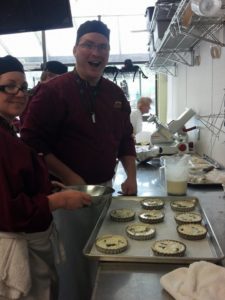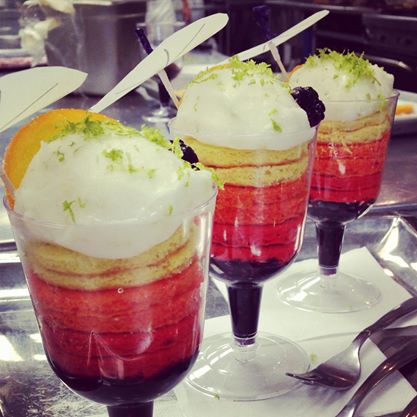By: Ryan Hodros, Pastry and Culinary Arts Student
I was going to write this piece about the transition from Chef Robert to our new chef instructor and the trials and tribulations of getting to know someone brand new. It was a good plan that I’d laid out weeks ago and felt confident in. But unfortunately for my blog (but fortunate for our class) our new chef instructor is Chef Kelly, whom I’ve already worked with in the Pastry Arts program.
That being said, not every new student to Auguste Escoffier will be fortunate enough to know the faculty before starting class, and so here are a series of tips and tricks you can use to make your transitions from block to block more pleasant.
1. Work harder
I understand that you work hard. If you were lazy, you wouldn’t have dreams of working in a kitchen. But chances are fair that you also know that you can work harder if you had to. You could take less breaks. You could multitask. You could do X Y and Z that you don’t normally do because you don’t want to have a nervous breakdown in class, and sometimes it’s hard to keep that breakneck speed all day every day.
But imagine that your reputation is a thing you buy, not a thing you earn, like a car. You either pay a great deal up front and make smaller payments throughout, or you pay big every month until the day you’re all paid up. That’s how it works in the kitchen. You bust your backside for a new chef in the first few weeks to prove that you can, and then you can back off when the workload allows for it because you’ve already earned the reputation as a hard worker.
This might seem like gaming the system, but you have to understand that you can tell a chef all day long that you can work as hard as the rest of them. But if you prove it straightaway, they’ll know what you’re capable of without talk, and that goes a long way.
2. Participate
I’ve worked as an educator in the past and I can tell you, nothing makes a teacher’s day go longer than a class that doesn’t participate. You work to develop a lesson plan, you rehearse in your head what you’re going to say, you make notes about what you think is going to be difficult…you prepare and prepare and prepare, and then you get to the classroom and you stare into an abyss of blank faces.
So participate. You’re passionate about kitchen stuff. Pipe up and let your voice be heard. We’re all afraid of being wrong, but get over that and let the instructor know how much you care. Don’t be a drop in that sea of eyes, make yourself an island of participation (this metaphor is pretty labored, I know) and your chef will love you for it.
3. Talk
This extends beyond the classroom and into the normal world of social interactions. It’s easy to forget, but your chef is a human being just like you and me and everyone else. So ask questions and strike up a conversation. This is the hardest part for me, as I am naturally a quiet and reserved kind of guy, but people skills are important and you should try to cultivate them as much as you can.
But beyond that, if you get to know your chef (and they get to know you) working your tuchus off for them will seem like less of a chore because you don’t want to let them down. You obviously don’t want to be a blabber mouth and waste time in the kitchen with gabbing, but if you develop the ability to work and chat, your time in the kitchen will be better for it.
4. Study
This seems like a no-brainer, but come on. Admit it. Sometimes you skip reading assignments. Sometimes you skate. It’s okay. Everyone does. But if you want to participate in class, having a base knowledge goes a long way towards asking intelligent questions.
And it goes beyond just the assigned readings. If you have time, do some independent study on topics you find interesting. I watch Good Eats reruns on the Food Network, and that supplies me with a plethora of questions when I get to the classroom. I’ve read a number of books on gastronomy and the history of food (more than is healthy, if we can be honest) which give me solid questions and remarks to be made in the classroom.
Don’t start sweating, because you don’t have to read as much as I do. I have the reading sickness. But it is a good idea to thumb through a book or two outside of the syllabus whenever you get a chance. The more you know, the better a student you can be.
5. Work Harder
Yes, it’s listed twice. There is no better way to endear yourself to a chef than to prove you can be counted on for hard, fast, and efficient work. So go back and re-read #1. It’s that important.
Don’t let all that scare you though. You can work harder than you’d think, and if you’re considering a life in the kitchen world, chances are you already outwork most of your colleagues and are looking for a challenge. This is definitely it. Apply yourself, and the rewards will come. That’s how the good kitchens operate.




